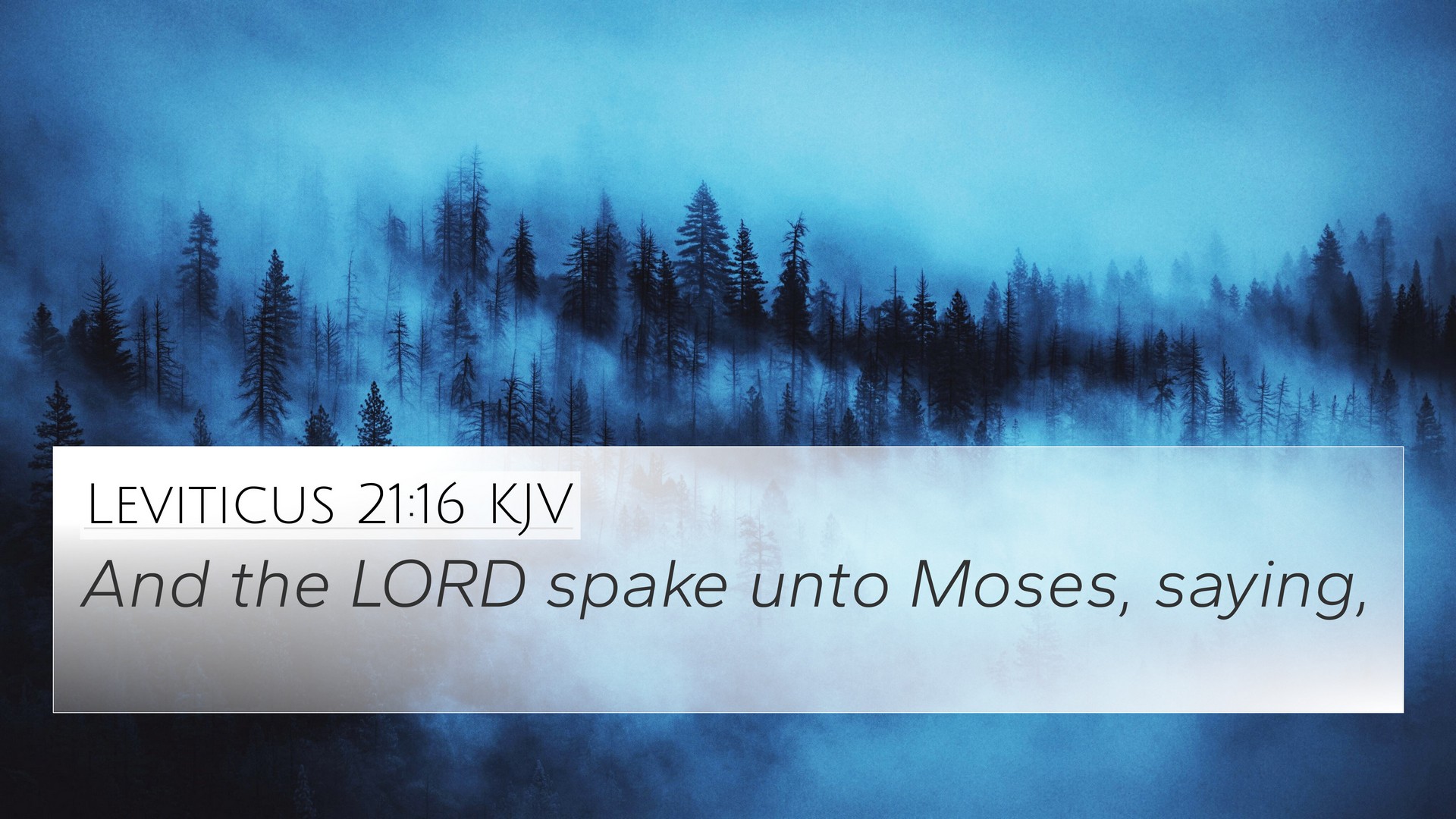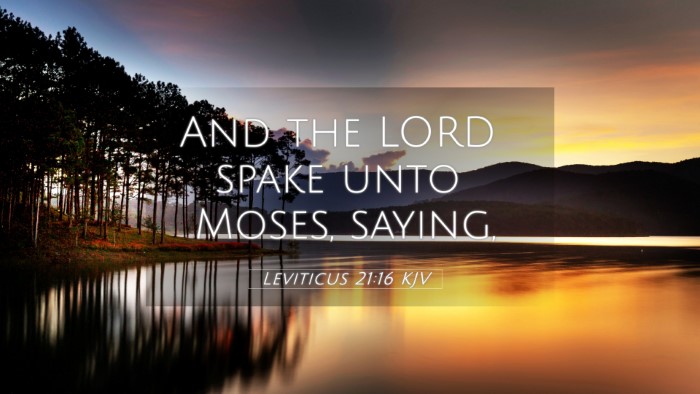Understanding Leviticus 21:16
Leviticus 21:16 states: "And the LORD spake unto Moses, saying," followed by specific commandments meant for the priests. This verse serves as a crucial introduction to further instructions aimed at maintaining the holiness of the priestly lineage.
Summary of Meaning
The verse highlights the significance of divine instruction as it pertains to the chosen priesthood of Israel. It emphasizes God’s ongoing communication with Moses regarding the standards that must be upheld by those in the religious office. The priests were expected to adhere to strict moral and ceremonial codes, illustrating God's demand for purity and holiness in worship.
Insights from Public Domain Commentaries
-
Matthew Henry:
Henry emphasizes that God is the source of the priests' authority and guidelines. They are reminded that their roles require a high standard of holiness due to their unique relationship with God. This verse marks the initiation of specific decrees that stress the separation required for those who serve in a sacred capacity.
-
Albert Barnes:
Barnes points out the importance of this verse indicating that the laws given were critical for distinguishing the priestly class from the general populace. He suggests that these laws serve not only for the priests' sanctification but also for the edification of the congregation they serve. The ongoing revelation underscores God's desire for purity among His people.
-
Adam Clarke:
Clarke discusses the implications of the LORD’s words, noting that they denote both authority and responsibility. He elaborates that this message to Moses is vital for ensuring that the priests maintain their roles in a manner that reflects the holiness and righteousness of God. The carelessness in upholding these standards jeopardizes the integrity of worship and the covenant community.
Bible Cross-References
The following verses are closely related in theme and impart similar lessons regarding holiness, priestly conduct, and divine communication:
- Exodus 28:1: Establishes the roles of Aaron and his sons as priests, emphasizing the chosen nature of priestly service.
- Leviticus 10:3: Speaks on God's holiness and the need for reverence, illustrating consequences of dishonor among priests.
- Numbers 3:10: Exhorts the Levites to perform the duties of the priesthood, reinforcing their appointed roles.
- Ezekiel 44:15: Delivers a prophetic message regarding the future duties of the priests, indicating ongoing divine instruction.
- 1 Peter 2:9: Connects New Testament believers to a royal priesthood, thereby linking the roles across the Testaments.
- Hebrews 5:1: Discusses the qualities required in a high priest, reflecting the characteristics expected of the Aaronic priests.
- Malachi 2:7: Emphasizes the role of priests as messengers of the Lord, underlining the need for integrity in their duties.
Connections and Themes
Leviticus 21:16 serves as a foundational text for understanding the connection between the offices of the Old Testament priests and the expectations that modern believers, seen as a royal priesthood in 1 Peter, must live by. This thematic connection signifies a continuation of God's call for holiness through His people.
Comparative Bible Verse Analysis
This verse invites an examination of how biblical themes of priesthood and holiness apply through the ages. For instance, observing the transitions from the Levitical priesthood to the New Testament priesthood provides insights into God's unchanging nature and the evolving understanding of holiness.
The Role of Cross-Referencing
Utilizing a Bible concordance and Bible cross-reference guide can enhance one’s study by identifying connections between passages that may not be obvious at first glance. Engaging with Bible reference resources allows communities to gain a deeper understanding of the theological implications and thematic relevance of scriptural interactions.
Tools for Bible Cross-Referencing
There are various tools for Bible cross-referencing that can aid in understanding complex themes like those presented in Leviticus 21:16. These tools help in:
- Finding connections between Old and New Testament teachings: Discover links between verses to understand the continuity of God's message.
- Examining detailed cross-references: Delve deeper into how particular themes resonate across different books.
- Identifying similarities: Explore how specific passages relate in terms of moral and spiritual teachings.
Conclusion
Leviticus 21:16 is more than an isolated command; it reflects God's ongoing dialogue with His people about the standards of holiness and righteousness essential for worship and community leadership. Through cross-referencing, believers can explore the rich networks of Scripture that reveal the depths of God's purpose and His call for all to uphold His standards of holiness, thus connecting the past covenant of priesthood with the present-day believer's responsibilities.


